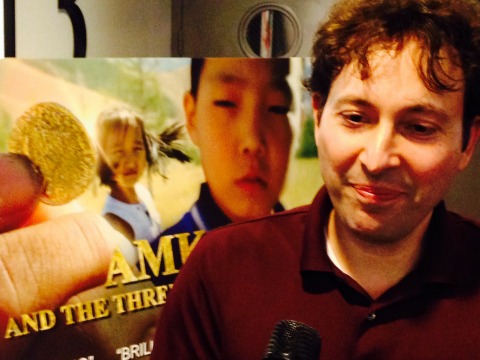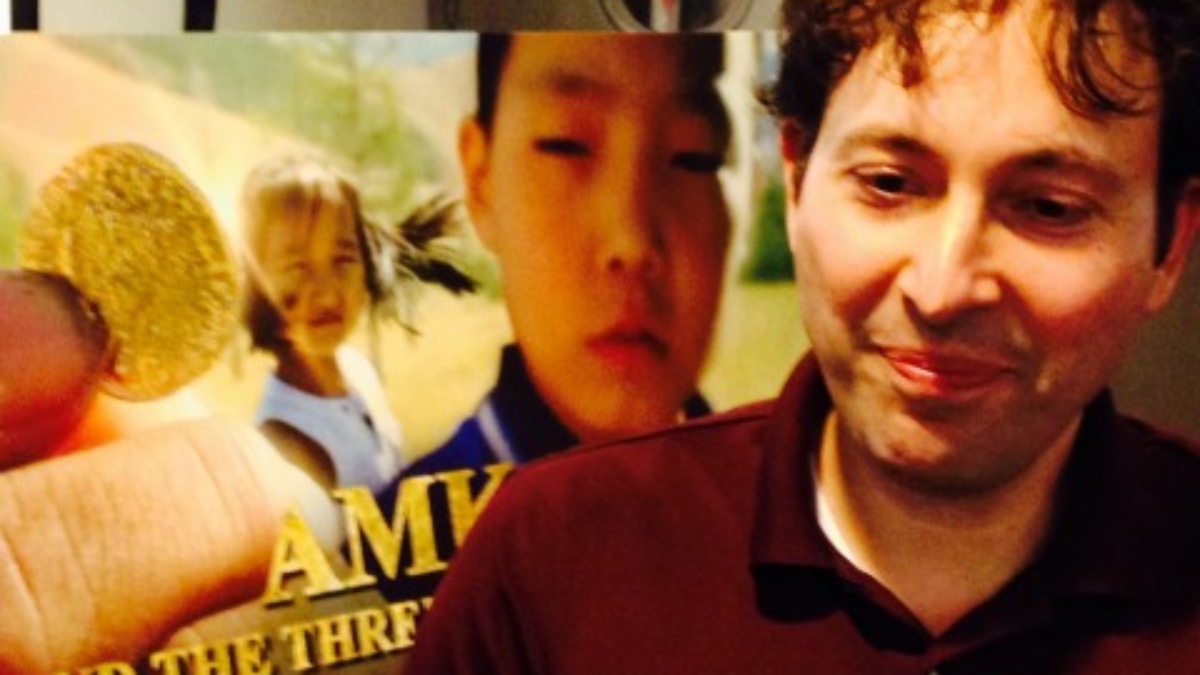CineVue met up with Director Babar Ahmed this May at the New York Indian Film Festival and interviewed him on the process of filmmaking for Amka and The Three Golden Rules, a film about a ten year old Mongolian boy who discovers a gold coin and becomes victim to materialism.

CV: As a Pakistani-American, why would you be interested in making a film about a Mongolian boy? What’s your background, especially in terms of filmmaking? Why did you conceive this story?
Babar Ahmed: My name is Babar Ahmed. My background is economics, but I took a short course at New York Film Academy. The culture there is very different. There is no barrier in the filmmaking field. It doesn’t matter if you’re young, from which cultural background or which university you went to. I feel like I saw something more than I had seen. The way people talk about filmmaking is also different. It’s not about how much money you can get from doing it or a career path that promises you a good income and position. It’s not about all that. It’s about building something. I’ve never known that such thing existed. So I took the course, started to make some short films and participated in other projects. That’s how I got into filmmaking.
Someone I know had an interest in Mongolia. It’s more about the resources discovered in Mongolia. For the last 800 years, Mongolia has been known for Genghis Khan. That’s what people know about Mongolia, but for the last decade, Mongolia has discovered coal, gold, copper, oil. All these resources have put Mongolia on the global stage. Suddenly, everyone wants a piece of Mongolia, a piece of gold. China, Russia, Korea, all of them have interest in Mongolia, and all the other countries as well. So now Mongolia is on the global stage, but the interesting thing is that cultural Mongolia in many ways is still very traditional. There is rarely any other culture in the world that I know of that still preserves its traditions, in terms of how they view the world, how they view human beings and how little value they put on materialism.
I went to the countryside and found two gers. A ger is like a tent, but it looks like a tent. There were two of them on the roadside. I asked, “Where is the division of the land between these two houses?” The translator accompanying me did not answer the question. I thought that maybe he didn’t understand my English, so I just repeated my question again. (His English is actually very good.) He said, “I don’t understand what you said. Why there should be division between two houses, when both sides can use the land equally?” This is Mongolia. I don’t know if in any other country, there will be anyone who thinks like that. The definition of success in Western society is all about how much money you make. When people say, “Look at how successful that person is,” it actually means “Look at how much money he or she makes.” However, there is this culture in which being a human being or being communal is more important. For example, once we were eating at a restaurant, one of our crew members who is Mongolian ordered a plate of food, and two other random Mongolians came in, then suddenly they were all eating from the same plate just like they had ordered it together. In the western countries, they will either sue you, or become violent and yell at you. While in Mongolia, the whole point is sharing what you have. Mongolia has this tradition, but now because of the discovery and the interest people have in the country, it brings the flood of globalization and high value.
The film is about a boy who discovers a gold coin. He is a boy with good nature, but because of his discovery of the gold coin, he gets access to money and becomes greedy. He starts to borrow more money, spends all of it on video games, and gets alienated by his family. This materialism takes away his personality. Then, he goes to the countryside where his traditional uncle teaches him three lessons in life from which he is able to assimilate himself into the new globalization and at the same time kept his traditions. That’s the story of the film.
CV: Regarding the topic of Genghis Khan, I feel that he is always this legendary figure, especially within the realm of cinematic imagination. Is the cast of the film all non-professional actors?
BA: For me, casting is the most important thing in the filmmaking process. Many people still think that Mongolia is all about horses, camels and Genghis Khan. However, if people go to Mongolia today, you’ll see all the young people in the city wear designer clothes. Although they still have their traditions, you can see the Western influence everywhere in positive and negative ways, of course. The present Mongolia is both very modern and traditional. People are very familiar with all the pop songs, movies, trendy brands in America and England, etc. They keep up with all the modern culture, but still preserve many traditional values. As for the casting, the story is about a ten-year boy from the ger district which is on the outskirt surrounding the capital, Ulan Bator. We actually casted pretty much every actor from the ger district. Most of them had no experience in acting or being filmed in front of the camera. What I felt is that Mongolians are naturally good actors. This is my fourth movie. For the acting in the film, it got the best review among all of my works, even though there is no professional actor in it. In my previous films, I had Oscar-nominated actor, but the review wasn’t overly positive. So I do think the casting is very important.
CV: I have this impression that for historical subject matter, the narrative of films set in Mongolia tend to be more dramatic and mythic. Otherwise, it goes towards an opposite direction of commercial films zooming in on the urban life. But AMKA didn’t go on either extreme. The narrative centers on the urbanization of traditional culture as well as the hybridization and conflict between modern and traditional values. In terms of the filming style, I find it adequate to adapt the observational and direct cinema methodology to capture the character’s life in transition. In addition, how was your experience working with child actors? Children are natural actors in some ways. Was it easy to get what you wanted from their performance, or was it difficult to instruct them?
BA: It is true that most films set in Mongolia mainly focus on either mythical or urban story, but what I did with my film is the integration of both. It shows the full spectrum of Mongolia. As for working with the child actors, it was not difficult at all. They have no inhabitation yet, so you can always get best and most natural performance out of them.
As for the style, there were a lot of inputs by the team, so it wasn’t just my own decision or creation. It is also shaped by limitation. In my previous experience, I found that there was almost no limitation. I could always get the best equipment, best crew, well-known actors, but it didn’t work out well. At least for the audience, it didn’t work. By contrast, when filming in a country like Mongolia, you ultimately have to face many limitations. Everyone speaks Mongolian, so it took more time to communicate with the crew. And there was only one camera available for filming. There was no backup. Many of the crew members were members living in the ger district who had never working on set. We had server limitation when shooting the film. You would have expected that the film wouldn’t come out that well, in terms of the story and geography. However, I think that with the Mongolian crew and cast, their intention with the film was very sincere. Their intelligence and familiarity with the culture helped me tell the story. As a filmmaker, that is very important to me. If I had to do all that by myself, I couldn’t have done so much. There was not much I could do. Most of the crew was from the ger district, so culturally they’d given me a lot of guidance and advice.
CV: Did the child actor understand the connotation of the scene in which he bursts into tears in his uncle’s arms?
BA: In Mongolian culture, they really respect the children as individuals. The kids are very mature, not in the adult-like way, but they are emotionally mature. In the audition, you could already tell that there was something special about him. He had a great sense of humor which came within him naturally. It is not pretension or performative skill. On the other hand, he was capable of understanding the sadness, negative emotions of the story and bringing that out in his acting. I really have to give the credit to him.
CV: When developing this film, have you ever consulted other films as references? For me, the film reminds me of Pema Tseden’s works and other Chinese independent films. Tseden has made, Old Dog, The Search and The Silent Holy Stones. Your work resonates with his, in the sense that they both look at a boy living in the rural area, indulging in television and internet.
BA: Before going to Mongolia, I watched several Mongolian films that I could get access to, The Story of the Weeping Camel (2003). Those are truly amazing films. One thing I don’t want to do is make the film within the Hollywood framework. I’ve done that before, but with this film, I didn’t want to take any film as guideline and just follow that path. I guess that is the reason why this film is very different. In this film, I wanted to focus on the character’s condition and how the character interacts with people and things around him. I wanted the story to be less story-driven. I wanted to have a different way of storytelling that is diverted from the classical Hollywood style. So I don’t think I really have a film in mind as my reference or guidance. A lot of guidance really came from the knowledge of the local Mongolian crew. They were the reference points, in terms of developing the story. Especially in the part where the boy leaves the city for the countryside, they really gave many inputs that make the transition believable and more adequate.
CV: How did you get the funding to make this film?
BA: Initially, there was a company involving, but they backed out. So later on, we had a private investor to finish the film. And the New York Film Academy helped us market the film. I think the marketing of a film is very important. Even if it is a brilliant piece of work, if people don’t know about it, not many of the audience will come to see it. The academy not only taught me how to make film, but also how to make your films reach out to the largest possible audience.
Main image: Photo of Ahmed at a screening of Amka and The Three Golden Rules. Photo credit: Image courtesy of Voice of America.

